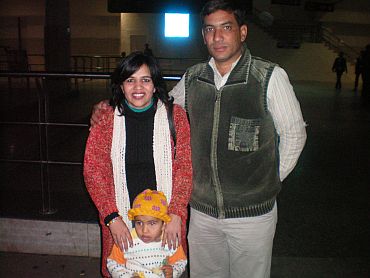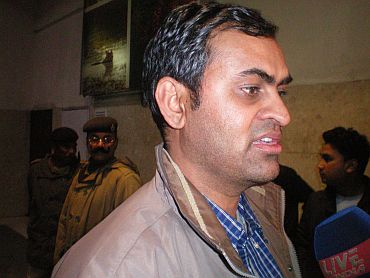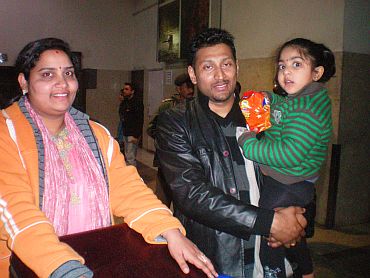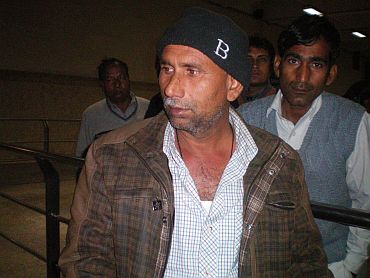
They look tired, sleep-deprived, hungry and afraid. But they all have something in common -- they sport a smile, a smile of relief. Indian government's mission, nicknamed 'Operation Safe Homecoming,' of bringing back an estimated 18,000 Indians stranded in violence-torn Libya has achieved more success as 266 more Indians landed at the New Delhi international airport at 1.30 am on Tuesday.
331 more Indians landed at 4.30 am in another special Air India flight. The mission has three navy ships and two charted ships for more evacuation.
Scotia Prince, a private ship, which happened to be in the Red Sea when violence broke out in Libya, is already on its way to Alexandria in Egypt with 1,100 Indians onboard, who will then take a flight back home from there.
Rediff.com caught up with some of the people, who landed at the Delhi airport.
Savita Kumari works as a lecturer of computer science in the Faculty of Engineering College in Al Zavia, which is currently under the control of the Libyan protestors.
Kumari had left behind her three-year-old daughter and husband in Gurgaon to take up the job. She had gone to Libya one and a half years ago looking for better pay.
"I used to work as a lecturer in Vanasthri Vidyapeeth in Haryana. My husband is also a lecturer in a Haryana university affiliated college in Gurgaon. We could barely make ends meet. That is why I jumped at the opportunity when I saw their advertisement in a newspaper," Kumari says.
Her relieved husband, Rakesh Kumar, says that when he came to know about the violence in Libya, he could not get in touch with her over the phone. That was when Skype came as a blessing for these two.
"Skype helped so much. It was much more satisfying than the telephone. I was worried, sick and she could not get a flight back home. Seeing her reassured me," Rakesh says.
Kumari, who stayed in a one-bedroom flat near her college in Libya, said that it was especially difficult for her because she lived alone.
"Hearing gunshots was a normal thing there. As soon as violence broke out, our VC told us all that we need not come to college anymore. For almost 15 days, I did not step out of home. I was constantly in touch with the Indian embassy and finally they informed me on Sunday that I could take this flight. I am so relieved. I don't know if I want to return there," Kumari says.
Please ..

Madan Singh lives in Kesarbanga, which is some 30 kilometers from Libyan capital Tripoli. He claims that the Libyan army stole his money and mobile phone at the nine checkpoints he encountered on his way to the airport.
"There was an army checkpont at every kilometer. And each time, you had to get out and be strip searched. They took my camera phone at one of the checkpoints, saying it was a security hazard. At another they took my dollars, saying that it was dangerous to carry dollars," Singh says.
There was no relief for Singh even after reaching the airport. He could not get a seat on the previous special flights arranged by the government. So he had been camping under a tree at 6 degrees Celsius outside the airport for three days.
"It was so stressful. There were no hotels nearby and I spent nights under a tree. I had to use public toilets for basic ablutions," Singh says.
Singh, who hails from Jaipur, has been working in a carpet company as a shift manager for five years. Prior to that, he was working in Dubai.
"How I wish I had never left Dubai. I had left for Libya along with 40 others and now I regret it. I will never go back to that country again," Singh says.

They make their way out pushing the trolley of their six month-old baby, looking relieved. Feroze, and his wife Izza, have been staying in Tripoli for about four years. Feroze, who hails from Mumbai, had left for Libya after his Malyasia-based construction company offered him the role of project manager.
"There is a lot of horror on the streets there. We barely could get out. There are so many Indians back there. What the Indian government should realise is that people cannot even cross the street for buying basic rations. The situation is that dangerous. We are among the fortunate ones to have made it back home," Feroze says.
Izza says that she was most concerned about her baby, who was born in Tripoli about six months, and her eight-year-old daughter.
"My elder daughter's school closed down the moment violence broke down. Our first priority was leaving the country because of our daughters. It is such a traumatic experience for children to be there in times like these," Izza says.
Feroze's company has now shut its Tripoli office and has offered him a job in Malaysia.
"I won't be going back to Libya. We will be moving to Malaysia as soon as possible," Feroze says.

Sinimol had gone to Tripoli about seven years ago, after she got an offer from Tripoli Medical Center, a government hospital. Three years later, her husband Jeeny joined her there and got a job as a Logistics Manager in an IT company.
They are all praise for the Indian government.
"You should have seen other nationalities there. Egyptians and others are camping in tents outside the airport, waiting for some kind of word from their governments. We got in touch with the Indian embassy and it was so easy. We would get responses from the office of MEA even at 12 in the night. It was all thanks to our government that we are back here safe," Sinimol says.
The couple says that given a chance they would go back to Libya.
"The locals there respect Indians very much. Both Sinimol and I have taken leave and have received full support from our employers. We did not face any trouble there, even during the violence. Our neighbors, who are locals, were extremely understanding and even got us basic home supplies, when we were too afraid to leave home," Jenny says.

Kiswan Lal worked as a gardener in his native Ajmer in Rajasthan for all his life. When he turned 50, he got the opportunity to do the same thing in Tripoli for four times his salary, and he took it.
"I don't know whether to regret my decision, because I did make a lot of money," Lal says.
Lal also had to stay outside the Tripoli airport for three days under a tree because he could not get a flight out.
"Those three days were really bad, because it was really cold. We did not have access to basic items. Food and water was scarce too as there were days when people would not open their shops. The worst part was that I could not even call my family to tell them I was okay, as most of the time, the network just remained jammed. Even when my wife tried calling, she would find the network busy and it really worried her," Lal says.
When asked if he would like to go back, he says he is not sure.
"I am sure my wife will not allow, but I may go back because Indians are treated with a lot of respect there. For now, I am just thankful to God that I am back home. When the violence dies down and a government becomes stable, I may just decide to go back," Lal says.